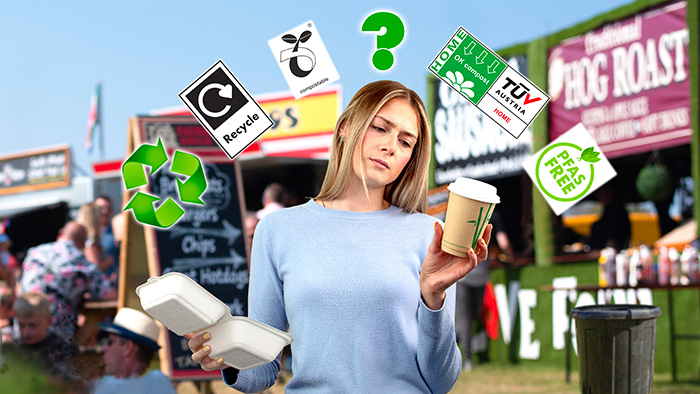Survey Demonstrates Importance Of Certified Recyclable Or Compostable Packaging

“Over three fifths (61%) of survey respondents said that information on packaging is what they rely on the most to keep them informed about its correct disposal, underwriting the importance of it being properly certified.”
A survey by Sapio Research, conducted on behalf of Celebration Packaging, has looked at consumer understanding of logos and terminology used for disposable foodservice packaging.
“Over three fifths (61%) of survey respondents said that information on packaging is what they rely on the most to keep them informed about its correct disposal, underwriting the importance of it being properly certified,” says Celebration Packaging Managing Director Nick Burton. “However, the survey has also shown that over 60% of consumers are unsure or chose the incorrect definitions for the terms recyclable and compostable, while only 38% find logos helpful in choosing how to dispose of food and drink packaging.
Recycling?
“Even though this survey has shown that 68% of consumers think that it is very or extremely important that food and drink packaging is certified recyclable, two thirds of respondents were not sure about or chose the incorrect definition for recyclable packaging (66%).”
Familiarity with the well‑established ‘Recycle’ logo, with its circular white arrow on a green background was high in the survey – with 89% of consumers aware of it – but varied according to age group, rising to 95% for the over 65s.
Despite being in use since the 1970s, the Möbius loop*, indicating that a product can be recycled, was familiar to less than half (48%) of those surveyed, while versions showing the percentage of recycled material included and the Möbius loop specifically referring to PET (Polyethylene Terephthalate) delivered only 31% familiarity.
When it comes to the process of domestic recycling and disposal, only 34% of those surveyed said that they separate packaging for recycling and thoroughly rinse the packaging before adding it to the recycling bin. This decreases to a mere 11% for the 18‑24 age group but increases to 53% for over 65s.
Compostable?
“We are not surprised that the majority of consumers are confused by the term ‘compostable’, says Nick Burton. “In the survey, almost two thirds (61%) were unable to correctly define the term and only 14% were aware of the two main compostable logos – the Din Certco Seedling logo and the TÜV OK Home Compost logo.
“The uncertainty means that while 56% say it’s very or extremely important that food and drink packaging is certified compostable, only 27% chose the proper disposal method.”
Over half (55%) knew what the TÜV OK Home Compost logo meant, but only 19% correctly identified that it means it can be composted at home – and even though it has been in use since 1997, over two thirds (69%) did not know what the Din Certco Seedling logo means.
“Worryingly, 28% of those surveyed said they would dispose of compostable food and drink packaging in the recycling bin, while only 27% said they would place it in a home compost pile,” said Nick Burton.
Survey Results Underwrite The Importance Of Certifications
“End‑user customers are becoming better informed and expect foodservice outlets to operate more sustainably. With single‑use plastic items banned, operators need to source alternatives and ensure that they are choosing truly sustainable products that are clearly certified as being recyclable and/or compostable. Doing so improves their credentials and gives their customers confidence in their brand,” says Nick Burton.
“When we created the EnviroWare® brand over 17 years ago, our declared mission was to seek out more sustainable packaging solutions. We have always believed that when sourcing sustainable packaging, the provenance of the raw materials is paramount – but ensuring that it can be properly disposed of at its end‑of‑life is equally important.
“Celebration Packaging has always invested in accreditations and certifications which we take very seriously, so that when we make environmental and sustainability claims, we can always back them up. This sets us apart from many competitors, while also giving our customers confidence to help them on their sustainability journey.
“Through certification by respected and established companies, we can confirm that the products we sell are: suitable for direct contact with food and drink; made from sustainable resources where applicable; suitable for recycling, and/or can be composted either industrially or at home.
“As a consultative business, we recommend that foodservice operators talk to us if they have any concerns about the environmental impact of the packaging they use.”
* Mobius loop – a triangle composed of three arrows looping back on themselves in a clockwise direction. It indicates that a product is capable of being recycled (rather than being made of recycled material). The symbol often includes a number, indicating the material the product is made from (such as PET), and/or a percentage figure explain that the packaging contains x% of recycled material.










































